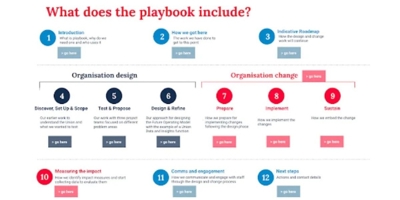The first gradual steps towards change
As the Covid-19 crisis began, the Union had slowly begun testing the future operating model which we designed together over the previous 9 months. However, the urgency of the pandemic required us to accelerate this process.
North East Lincolnshire’s Covid-19 response tested the approach we designed together, but on a much larger scale than initially planned and through a high pressure period. We had previously identified one commissioning opportunity to test the new model end to end, but Covid-19 had other plans for us.
Overnight, the challenges posed by Covid-19 meant new ways of working, models of partnership and use of data & insights were needed to address the crisis. The underlying principles of the future operating model acted as a guide for the Union to set up multidisciplinary ways of working, collaborative tools and new data sharing agreements to establish local shielding arrangements. Making insight led decisions to support those most in need was a joint effort, underpinned by the future operating model.
The impact of social isolation
As the model had been tested, the next step was to further embed the use of data and insights to benefit residents. The best opportunity to do this was by building on existing relationships with the voluntary and community sector (VCS) and providing further support within the community during the crisis.
Social isolation affects the physical and emotional wellbeing of a large number of people, especially the elderly. Covid-19 has exacerbated this issue, which was likely to increase over the coming months.
We were able to support decision makers to understand the residents’ lives and their experiences of social isolation more deeply through interviews with staff and residents. Rapidly understanding the scale of support they need by hearing real stories brought the issue of social isolation to life in a way it hadn't been before. The relationship with the VCS is now stronger than ever, and the Union is looking at further opportunities to work in this way together in the future.
Supporting staff through change
To move from building the first part of the model to full implementation we created a roadmap to illustrate to staff how to implement change incrementally, without feeling overwhelmed. This included design and implementation phases for each new function in the new operating model.
Providing clarity and transparency around what needs to happen and when through the roadmap built confidence in staff’s outlook towards organisational change. Communicating early and often is crucial as we moved from design to implementation.
When embarking on change at this scale, many job roles need to adjust, which naturally generates uncertainty. Communication was essential during this transition to make sure staff feel supported, heard and understood. We brought in a content design specialist who worked with the Union communication lead to developing the core messages, making sure we had clarity about what we wanted to share, how we wanted to share it and who we needed to share it with.
This strong sense of leadership and communication, paired with the new data and insights function, will allow staff and residents to build a shared understanding of the change happening in North East Lincolnshire.
Creating a change playbook
To help staff on this journey we also designed a change playbook that sets out a shared Union approach to organisation design and change, based on the work we’ve done together.
The playbook is a tool to help Union leadership, management and team members successfully implement the full operating model. It can also be applied more broadly across The Union going forward.

Throughout our partnership and the tools we’ve created, we’ve made sure to use accessible language. Not everyone has experienced terminology around design or agile approaches. By using language everyone knows and understands, we can make sure each staff member is able to engage with the change process.
Setting The Union up for success
We wanted to make sure The Union was able to make change happen long after we were gone. To do this, we had to strike a balance between guiding the delivery of the work and coaching staff so they could apply the tools and approaches we used with confidence and clarity.
By getting the ‘authorising environment’ right, leaders understand what decisions they need to make and who should make them, which has been an integral part of North East Lincolnshire’s crisis response. Throughout 2020 The Union supported staff to work with high levels of autonomy and consistency, understanding what the priorities of executive leadership are, what they need to deliver and how.
This gradual approach to full implementation will continue to support The Union as they build on the momentum of the work we’ve started together, throughout the Covid-19 crisis and beyond.

Building trust through prototyping
A connected ecosystem is critical for any council that commissions services to external providers, all of which have their own agendas and motivations. Rochdale Council is looking to build trust and stronger relationships by co-designing with the network that currently delivers these services rather than attempting to reimagine the future of the service alone.
Read moreOur recent insights

Building trust through prototyping
A connected ecosystem is critical for any council that commissions services to external providers, all of which have their own agendas and motivations. Rochdale Council is looking to build trust and stronger relationships by co-designing with the network that currently delivers these services rather than attempting to reimagine the future of the service alone.
Read more

